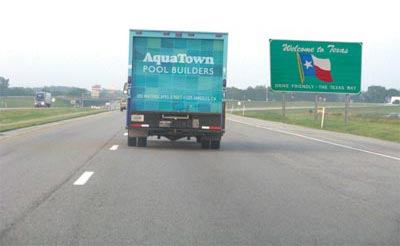As the Texas economy largely continues to keep its head above water, more pool companies are looking to open shop there.
Two years ago, Texas saw a migration of small- and medium-sized pool and spa companies into the state as the markets collapsed in Florida, Arizona, Nevada and California. Now, at least three larger Western firms — all Pool & Spa News Top 50 Builders — have either established new branches in Texas or are considering doing so.
“The market has been able to withstand the economic downturn much better than the areas that we were doing business in, namely Arizona and Nevada,” said Sam Lewis, general manager of Paddock Pools and Spas in Scottsdale, Ariz. “The big housing collapse didn’t happen there like it has in the other areas, so people still seem to have some equity in their homes. Employment relative to the rest of the country is still high. There’s a lot of new and good business there; there’s still growth and some home building taking place.”
Earlier this year, the megabuilder entered the market by default when it acquired Tempe, Ariz.-based builder Pacific Pools, which had opened offices in Austin and San Antonio approximately two years ago.
Also, Premier Pools and Spas of Rancho Cordova, Calif., entered into a licensing agreement with Bill Unger to open a Houston office. This is the start of a new program that the firm plans to roll out more extensively later in the year. Officials at California Pools , based in West Covina, Calif., said they are also considering adding Texas offices to their network of licensees, franchisees and company-owned offices throughout California and in Phoenix.
Paddock and Premier report success so far. “We were encouraged [that] we had a very high percentage of builds to sales, little fallout over financing problems or equity problems,” Lewis said. “The profit margins are also substantially higher in that area.”
Premier reports generating $1 million in sales in its first four months.
Paddock and Premier express an interest in growing in the state as well. “We’re also looking at probably expanding into Houston and the Dallas area coming up on next year,” Lewis said. “That doesn’t necessarily mean we’re going to open there. Right now we’re doing our due diligence.”
Premier has its eye on Dallas, San Antonio and Austin for potential new licensees. “It’s going to be dependent on whether or not we put together the right teams, either by getting an existing pool builder or bringing our own teams,” said Paul Porter, the company’s president.
It would be an exaggeration to say the state has gone unscathed, but Texas has fared better than most, with Houston currently the strongest market, according to area builders.
“We still have the oil companies here, and I think people know business is still doing OK,” said J.R. Richard, CEO of Richard’s Total Backyard Solutions in Houston, a Pool & Spa News Top 50 Builder . “They’ve been making money, and they’re fairly stable.”
But despite Texas’ relative resiliency, some parts of the Lone Star State have seen a significant downturn, with Dallas being the hardest-hit. Ironically, it’s one of the most competitive areas as well.
“Right now on the permit report, there are over 435 pool builders in the Dallas/Fort Worth Metroplex,” said Debra Smith, president of Pulliam Pools in Fort Worth, a Pool & Spa News Top 50 Builder . “The market and competition is already so tight that I can’t imagine someone trying to move into this area. There have been builders leaving.”
As for whether these big players will make a difference, some area builders say homeowners are more receptive to well-established, locally owned companies. For their part, the newcomers are betting consumers will be drawn to bigger firms.
“I think the marketplace is ready for a high-quality, national presence there because the licensing requirements are so lax in Texas,” Porter said. “A lot of people have been burned, so they’re looking to do business with national, credible brands.”
However, it’s too soon to speculate right now, Richard said. It could just be business as usual.
“Every year new builders pop up,” he explained. “And there are [always] guys going out of business, so when new companies come into the Houston market they’re just going to replace the guys who [went out of business] last year from the 2009 downturn.”



